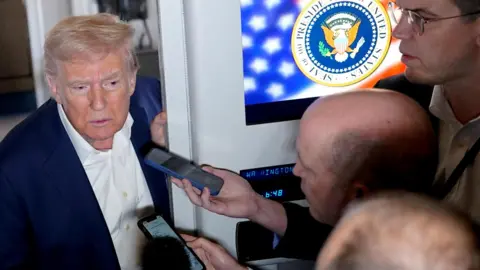Trump exempts smartphones and computers from new tariffs
 Reuters
ReutersUS President Donald Trump's administration has exempted smartphones, computers and some other electronic devices from "reciprocal" tariffs, including the 125% levies imposed on Chinese imports.
US Customs and Border Patrol published a notice late on Friday explaining the goods would be excluded from Trump's 10% global tariff on most countries and the much larger Chinese import tax.
The move comes after concerns from US tech companies that the price of gadgets could skyrocket, as many of them are made in China.
This is the first significant reprieve of any kind in Trump's tariffs on China, with one trade analyst describing it as a "game-changer scenario".
The exemptions - backdated to 5 April - also include other electronic devices and components, including semiconductors, solar cells and memory cards.
"This is the dream scenario for tech investors," Dan Ives, who is the global head of technology research at Wedbush Securities, posted on X. "Smartphones, chips being excluded is a game-changer scenario when it comes to China tariffs."
Big tech firms such as Apple, Nvidia, Microsoft and the broader tech industry can breathe a huge sigh of relief this weekend, he added.
The White House indicated the exemptions were made to ensure companies had more time to move production to the US.
- Why Trump is hitting China on trade - and what might happen next
- Was Trump's 90-day tariffs pause really a grand plan?
"President Trump has made it clear America cannot rely on China to manufacture critical technologies such as semiconductors, chips, smartphones, and laptops," White House Press Secretary Karoline Leavitt said in a statement.
"At the direction of the president, these companies are hustling to onshore their manufacturing in the United States as soon as possible."
Trump, who is spending the weekend at his Florida home, told reporters on Friday he was comfortable with the high tariffs on China.
"And I think something positive is going to come out of that," he said, touting his relationship with Chinese President Xi Jinping.
These electronic goods are still subject to the 20% tariff on China related to fentanyl, White House Deputy Chief of Staff on Policy Stephen Miller posted on X.
Some estimates suggested iPhone prices in the US could have as much as tripled if costs were passed on to consumers.
The US is a major market for iPhones, while Apple accounted for more than half of its smartphones sales last year, according to Counterpoint Research.
It says as much as 80% of Apple's iPhones intended for US sale are made in China, with the remaining 20% made in India.
Like its fellow smartphone giant Samsung, Apple has been trying to diversify its supply chains to avoid an over-reliance on China in recent years.
India and Vietnam emerged as frontrunners for additional manufacturing hubs.
As the tariffs took effect, Apple reportedly looked to speed up and increase its production of India-produced devices in recent days.
Trump had planned for a host of steep tariffs on countries around the world to take effect this week.
But on Wednesday he announced he would implement a 90-day pause for countries hit by higher US tariffs - except China, whose tariffs he raised to 145%.
Trump said the tariff increase for China was because of the country's readiness to retaliate with its own 84% levy on US goods.
In a dramatic change of policy, Trump said all countries that had not retaliated against US tariffs would receive the reprieve – and only face a blanket tariff of 10% – until July.
The White House then said the move was a negotiating tactic to extract more favourable trade terms from other countries.
Trump has said his import taxes will address unfairness in the global trading system, as well as bring jobs and factories back to the US.
